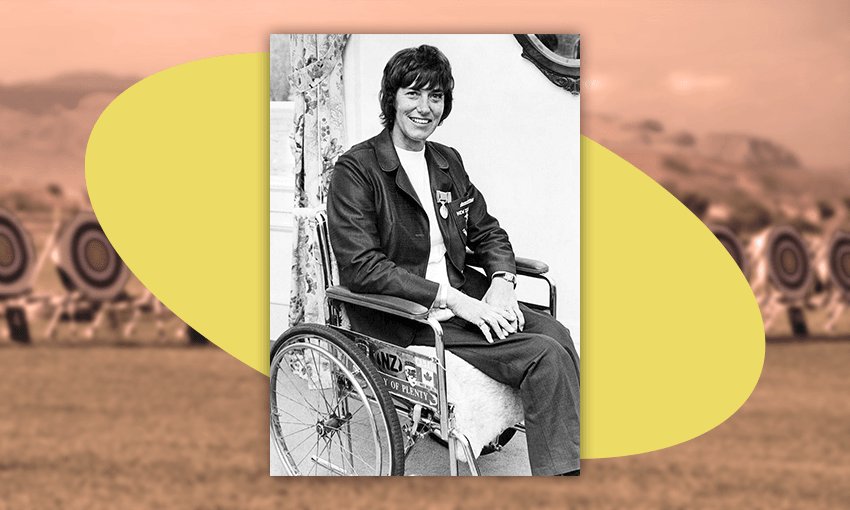She had a glittering international sports career and became a brave advocate for paraplegic rights, but Eve Rimmer is still largely unknown to the country she represented.
She led a life full of surprise, but what surprises me most about Eve Rimmer is that she seems to be largely forgotten. She was New Zealand’s greatest multi-sport athlete, winning national and international medals in shot put, javelin, pentathlon, discus, swimming and archery. Her Wikipedia page calls her “one of the best athletes in the world”.
How do I know she’s been largely forgotten? When I ask archers if they know who Eve Rimmer was, they typically shrug. When I ask the parents of paraplegic kids, they don’t know either. Even folks from Whakatāne, home of Eve Rimmer Park and the Eve Rimmer Games, aren’t sure. When I tried to buy her beautifully titled 1978 book, No Grass Between My Toes, I could find only three copies for sale in the entire country.
I bought them all. Gave one to an archer, one to a young paraplegic, and I’m sharing the third with my daughters.
When they were kids, Amber and Willow fan-worshipped Eve. She would stay at our house when I’d bring her down to lecture Otago med students about what life is like for paraplegics. She emphasised three things: 1. We need support, not sympathy. 2. Support includes doctors not assuming we’re invalids. 3. Support also includes getting rid of physical barriers in kerbs, hospitals, stadiums, shops and theatres.
I got a personal demonstration of the theatre barriers she was referring to when Eve and I tried to attend a lunchtime event at the university. It took me and three strong women to heft Eve in her wheelchair up the two narrow flights of stairs.
How did the Eve Rimmer the whole country once knew come to be? It happened one rainy night when she was a 15-year-old school dropout. She and her mates were off to a dance. The driver misjudged his speed on the wet road. The little car skidded, rolled, and when Eve came to, the car was sitting on top of her. From that moment on, she never walked again unaided.
She went on to: marry, have children, discover para-sports, win national and international competitions including at the first Paralympics , become both advocate and spokesperson for the disabled, become a most sought-after speaker, become greatly honored, here and abroad, including, in 1973,with the British Empire Medal.
That car accident wasn’t the only cruel twist of fate in Eve Rimmer’s life. In 1961, after she married electrician Kel Rimmer, he contracted with polio and lost the use of his arms. Eve used to say with a grin, “Yeah, a woman who can’t use her legs married to a man who can’t use his arms.”
Kel may have lost the use of his arms, but another organ worked — while he was still recovering, Eve announced, “Goodness gracious, I’m going to have another baby.”
That’s a quote from her book. Those who knew her may have thought, Hmmm. “Goodness gracious” doesn’t really sound like Eve. My all-time favourite Eve quote is one she told us at the dinner table: “Back then, at the movies, the whole audience rose to their feet and sang God Save the Queen. Well, I obviously couldn’t. But some yahoo shouted, ‘Why aren’t-cha’ standin’?’ I answered him just as loud: ‘I’m a Communist!’”
Back at home, Kel worked as tirelessly to regain his arms as Eve had her legs. When they bought an old house in Whakatane, he greatly modified it to handle her wheelchair. Meanwhile, scooching along on her backside, Eve yanked weeds from their wildly overgrown yard. “It was great exercise and training. The bigger stuff I sawed up to feed the fire, which again should have helped to build bigger and bonnier throwing muscles.”
It must have worked. In international athletics and swim competitions, Eve won 32 medals, 22 of them gold.
In 1996, at age 59, Eve Rimmer’s life came to an end. Here’s how No Grass Between My Toes ends:
Most people don’t know the real me — the one who lets go in private but never in public. I have deep depressions when I am alone — largely because of frustration. I don’t envy other people, but I do regret for myself that there are so many things that are denied me despite the apparent freedom and rewards I’ve enjoyed.
I would swap them all, everything I’ve had out of life, for two ordinary legs that work.
To get up and dance again.
To run down a beach and plunge into the sea.
To ride a bike through the countryside.
To walk free with the wind in my face.
To feel the grass between my toes.

